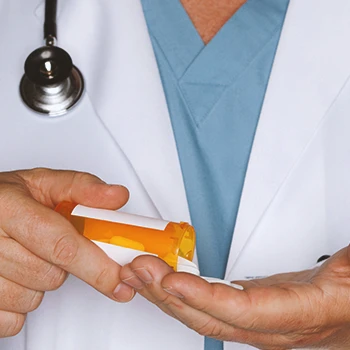The thyroid gland and testosterone levels are tightly linked.
We have known for a long time that the thyroid gland is partially responsible for regulating testosterone.
Given my experience with athletes using testosterone boosters, I've personally witnessed varying effects on thyroid function, compelling me to deeply research this area.
So I spent hours researching the science of how testosterone affects the thyroid to fully understand the matter.
I will share in detail the relationship between thyroid and testosterone and the treatments for thyroid disorders.
Keep on reading.
Quick Summary
- Testosterone influences the thyroid gland by decreasing its function at high levels and over-elevating it when low, highlighting a close relationship between the two.
- The thyroid gland affects testosterone levels by controlling sex hormone-binding globulin (SHBG) and indirectly influencing gonadotropin-releasing hormone (GnRH).
- The Journal of Clinical Pharmacy and Therapeutics highlights that testosterone may safeguard the thyroid against autoimmune disorders like Hashimoto’s thyroiditis.
- From my experience as a coach, maintaining a healthy balance of testosterone is crucial for thyroid health and overall well-being.
How Does Testosterone Affect the Thyroid?

Testosterone affects the thyroid by decreasing its function when T levels are high.
However, when they are low, testosterone impacts the thyroid by over-elevating its operations.
Hence, testosterone levels and thyroid function are closely related.
Thyroid Hormones Effect on Testosterone Levels
The thyroid gland is responsible for sex hormone-binding globulin (SHBG) levels in the blood, which pick up testosterone and hence decrease the amount of free testosterone in your blood, based on the Sexual Medicine Reviews journal 2019 study [1].
Additionally, the thyroid gland affects gonadotropin-releasing hormone (GnRH) indirectly through its influence on the body's overall metabolic state [2].
Increased levels of GnRH lead to increased testosterone levels.
Because the thyroid controls GnRH and SHBG, it is responsible for increasing and decreasing testosterone in your body.
Hormone Testosterone Effects on Thyroid Hormones
In my coaching experience, clients with extreme testosterone levels often showed signs of reduced T4 hormone release, as confirmed by a study in the Iranian Biomedical Journal [3].
Moreover, another study published in the Journal of Clinical Pharmacy and Therapeutics showed that testosterone might protect the thyroid from autoimmune responses in men with Hashimoto’s thyroiditis [4].
Therefore, this imbalance in testosterone levels can lead to disruptions in thyroid function, potentially affecting mood regulation and metabolic processes.
Testosterone's Role in Thyroid Hormone Transport
Testosterone significantly influences thyroid hormone transport proteins like thyroxine-binding globulin (TBG), transthyretin, and albumin in the bloodstream, according to a book published by the Cambridge University Press [5].
Changes in testosterone levels can impact the synthesis and availability of these proteins, altering how thyroid hormones are distributed and utilized in the body.
Testosterone and Thyroid Hormones in Brain Health
According to a study published in the Biology of Sex Differences journal, while thyroid hormones are essential for cognitive development, testosterone affects mood and behavior [6].
Hormonal imbalances can result in various neurological and psychiatric conditions.
Testosterone and Thyroid Hormone Metabolism in the Liver
The liver is a key site where thyroid hormones are converted from their inactive to active forms, primarily from thyroxine (T4) to triiodothyronine (T3), based on a study published in the Journal of Endocrinological Investigation [7].
Testosterone can influence this conversion process, affecting the overall metabolic rate and energy utilization in the body.
Thyroid Disorders and Low Testosterone Levels

Because the thyroid is responsible for regulating testosterone, many disorders or diseases that affect the thyroid can cause lower testosterone levels.
Hypothyroidism and Testosterone
A study from 2020 published in the Journal of Endocrinological Investigation states that hypothyroidism and low testosterone are connected because it is a disorder causing the thyroid to be underactive, which usually results in low testosterone [8].
Grave’s disease, Hashimoto’s thyroiditis, or the presence of goiter can lead to this disorder [9].
Some of the symptoms of hypothyroidism include the following:
- Tiredness
- Weight gain
- Depression
- Being sensitive to cold
- Muscle cramps and weakness
Many signs of hypothyroidism are similar to those of other illnesses, making it easily misdiagnosed.
Symptoms typically appear gradually, and you may be unaware that you have had the medical condition for several years.
With that in mind, it's essential to contact a doctor as soon as these symptoms manifest.
Related: What Causes Low Testosterone?
Hyperthyroidism and Testosterone
According to a study published in the Thyroid journal, hyperthyroidism can cause the thyroid gland to release extra thyroid hormone, which will, in turn, increase extra SHBG and extra GnRH [10].
While extra SHGB by itself may cause decreased testosterone levels, the high activity of the thyroid in hyperthyroidism usually results in increased testosterone.
Therefore, regular monitoring and appropriate medical intervention are crucial in addressing hyperthyroidism's effects on testosterone levels and thyroid hormone regulation.
Symptoms of hyperthyroidism in men include [11]:
- Fatigue
- Shakiness
- Fast heartbeat
- Muscle mass loss
- Anxiety
- Weight loss
- Feeling overly hot
- Erectile dysfunction
“The greater amount of thyroid hormone causes some functions in your body to become faster, like your heart rate. You may also experience weight loss and difficulty sleeping.”
– Kelly Wood, MD
Treatments for Thyroid Disorders

The treatment used to treat a thyroid problem depends on whether the patient has an overactive or underactive thyroid and the root cause of the issue.
Patients with hyperthyroidism may take anti-thyroid medications, beta-blockers, and surgery in some extreme cases [12].
People suffering from hypothyroidism are usually given extra hormones to make up for what their thyroids are not producing.
In my coaching career, I've always stressed the importance of regular testing for testosterone and thyroid function to pinpoint and manage any hormonal imbalances.
FAQs
Does Testosterone Affect TSH Levels?
Yes, testosterone affects TSH (thyroid-stimulating hormone). Research suggests high testosterone levels can stimulate the thyroid to produce extra TSH.
Does Testosterone Cause Hypothyroidism?
No, testosterone does not cause hypothyroidism. Hypothyroidism can result in irregular testosterone levels, but taking testosterone supplements or boosters will not cause a thyroid disorder.
Can I Take Testosterone With Thyroid Medication?
No, you cannot take testosterone with thyroid medication. Thyroid medication can interact with anabolic steroids and testosterone boosters.
If you are on any medication, always talk to a doctor or pharmacist before beginning a supplement or steroid.
References:
- https://www.sciencedirect.com/science/article/pii/S205005211930071X?via%3Dihub
- https://www.ncbi.nlm.nih.gov/books/NBK279070/
- https://www.ncbi.nlm.nih.gov/pmc/articles/PMC3882926/
- https://pubmed.ncbi.nlm.nih.gov/31183891/
- https://www.cambridge.org/core/books/abs/an-introduction-to-neuroendocrinology/regulation-of-hormone-synthesis-storage-release-transport-and-deactivation/75DEA3BE775896FFC660C4D8CBB12E7D
- https://bsd.biomedcentral.com/articles/10.1186/s13293-021-00367-2
- https://pubmed.ncbi.nlm.nih.gov/32166702/
- https://pubmed.ncbi.nlm.nih.gov/15142373/
- https://www.niddk.nih.gov/health-information/endocrine-diseases/hypothyroidism
- https://pubmed.ncbi.nlm.nih.gov/15142373/
- https://www.ncbi.nlm.nih.gov/pmc/articles/PMC6619426/
- https://medlineplus.gov/thyroiddiseases.html
About The Author
You May Also Like






